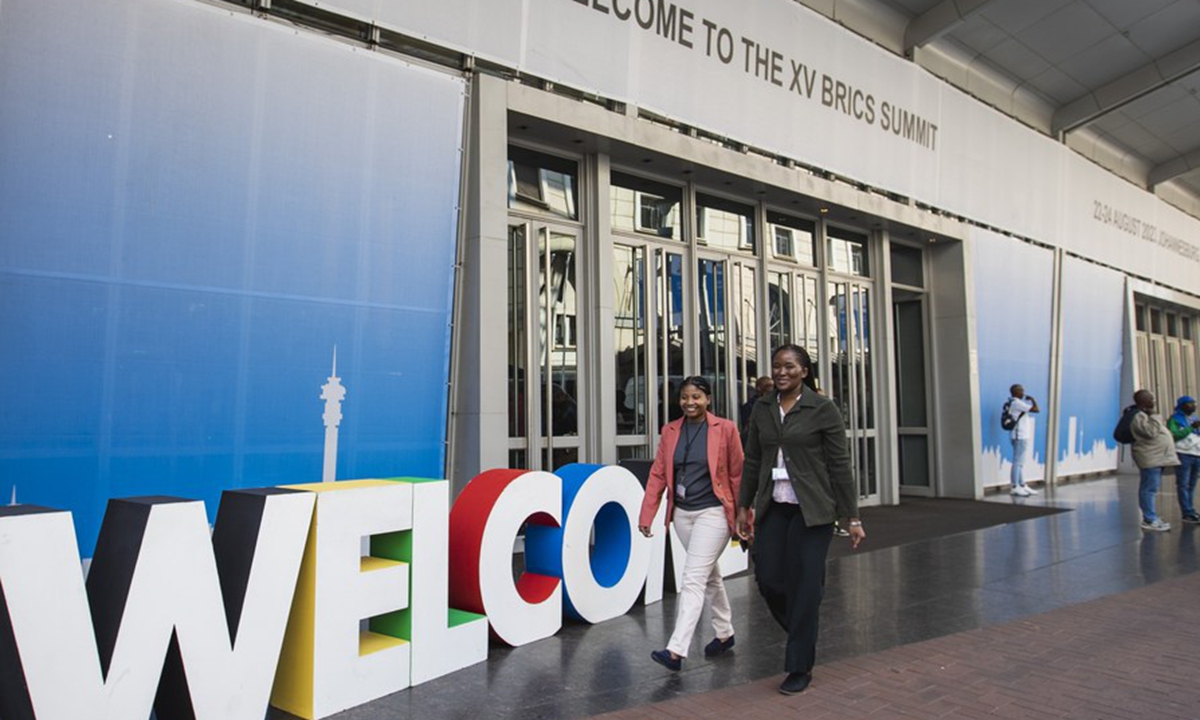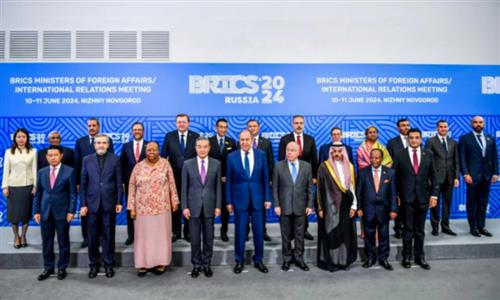
People walk near the venue of the 15th BRICS Summit in Johannesburg, South Africa, Aug. 20, 2023. (Xinhua/Zhang Yudong)
Thailand has submitted a formal letter requesting to join BRICS and hopes to receive positive feedback, said Thai Foreign Ministry spokesperson Nikorndej Balankura, in a bid to become the group's first member from Southeast Asia.
Observers said on Friday that BRICS' continuous expansion demonstrates the Global South's joint call for cooperation and pursuit for a fairer global order, and Thailand's potential membership could be a prelude to more ASEAN members joining BRICS.
Thailand is eyeing membership as early as October, when the group hosts leaders' summit in Russia. Joining BRICS would allow Thailand to gain further leverage in advancing South-South cooperation as well as play a more proactive role and contribute to crafting the global architecture, Nikorndej told a news conference, Xinhua News Agency reported.
Thailand attaches importance to prioritizing multilateralism and strengthening the role of developing countries in the international arena, which aligns with BRICS principles, and participating in the group would also enhance the kingdom's opportunities on the international stage, a government statement said.
BRICS is the acronym for an emerging-market cooperative mechanism that initially included Brazil, Russia, India, China and South Africa. In January, the bloc expanded its membership to include Saudi Arabia, Egypt, the United Arab Emirates, Iran, and Ethiopia.
So far, countries including Venezuela, Kazakhstan and Belarus have also filed applications for participation.
Wang Youming, director of the Institute of Developing Countries at the China Institute of International Studies in Beijing, told the Global Times on Friday that joining the group will provide Thailand with new opportunities in investment, exports and new technology cooperation.
However, there have been voices of opposition to Thailand's move. An article in the Bangkok Post claimed Thailand's intended entry into BRICS is misguided and poses liabilities to its international standing and credibility amid "the West" vs "the Rest" conflict.
But Thai Foreign Minister Maris Sangiampongsa iterated that the move did not signal support for any side or an attempt to counter anyone else's power. Maris saw the BRICS network of countries as an economic opportunity and spoke about justice and equality for developing countries. It was about developing countries playing a greater role in driving world affairs, he said on June 13 during a BRICS event.
Thailand took a brave step forward, as many countries are still hesitating due to efforts that deliberately depict BRICS as being in confrontation with the West, which is a "pure misinterpretation," Wang said.
BRICS has not targeted any country, or sought confrontation, alliance or taking sides from its very beginning, and that is the reason why it is attracting more countries from the Global South that aspire for a fairer, multilateral global order, Wang said, adding that emerging economies have the motivation to come together to make their voice louder and more influential.
Those depicting such a choice as "taking sides in major power politics" expose their disregard of Global South's needs, and their ignorance of true multilateralism, analysts said.
So far, more than 30 countries have expressed interest and 10 have filed official applications to join BRICS, according to public information.
Wang believes Thailand's move could encourage more in Southeast Asia to take a step forward, as Malaysia and Indonesia have also expressed interest alongside some concerns.
Malaysian Prime Minister Anwar Ibrahim said on June 13 that his government would soon begin the process of joining the bloc.
Wang said the expansion of BRICS will continue and the formats will diversify, as some candidate countries could engage in the BRICS agenda as "partners," considering that BRICS has certain standards regarding admission of new formal members, including consensus of all existing members.
Including a country with strong geopolitical inclinations also brings risks to BRICS' agenda of cooperation and solidarity, analysts said.


